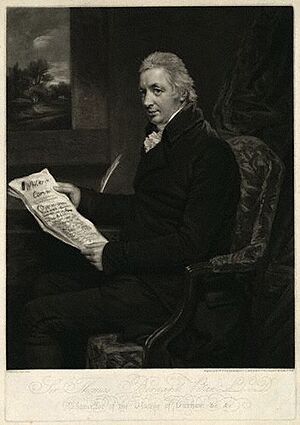Sir Thomas Bernard, 3rd Baronet facts for kids
Sir Thomas Bernard (born April 27, 1750, died July 1, 1818) was an important English social reformer. This means he worked to make life better for people, especially those who were struggling. His father was a governor in America before the American Revolutionary War, a big event in history.
Contents
A Life of Helping Others
Thomas Bernard was born in Lincoln, England. His father was named Sir Francis Bernard. Thomas became a Baronet, which is a special title, in 1810. He received this title after his older brother passed away.
Early Life and Education
Thomas went to Harvard College for his education. His father was very interested in the college. After college, Thomas worked as a secretary for his father. Later, he moved to England. There, he became a lawyer, specializing in property law.
Focus on Social Work
Thomas married a wealthy woman and gained a lot of money. He then decided to spend most of his time helping others. He focused on social work to improve the lives of poor people.
From 1795 to 1806, he was the treasurer of the Foundling Hospital. This hospital was a home for abandoned babies. He played a very important part in running this charity. Even after he stopped being treasurer, he continued to help. He was a Vice President of the charity until 1810.
Founding New Charities
Sir Thomas also helped start several other important groups:
- In 1796, he helped create the "Society for Bettering the Condition and Increasing the Comforts of the Poor." This group aimed to make life better for people in need.
- In 1800, he helped open a school for blind people who were poor.
- In 1801, he helped start a special place to care for people with fevers.
- He was also a founding director of the British Institution in 1805. This institution supported art and artists.
Improving Public Health and Education
Sir Thomas was very active in promoting vaccination. This was a new way to protect people from diseases. He also worked to make conditions better for children working in factories. He supported giving small plots of land to poor families for gardening. He also spoke out against high taxes on salt, which was a basic need.
He cared a lot about education. With another famous person, Count Rumford, he helped start the Royal Institution in London. This place was created to teach people about science.
The Regent's Canal Project
Sir Thomas was also a director and strong supporter of the Regent's Canal. This was a big project to build a canal across north London. In 1811, he was approached by John Nash (architect), a famous architect. Nash was a big supporter of the canal.
Social reformers like Sir Thomas liked canals because they made coal much cheaper. Cheaper coal meant poor families could afford to heat their homes. It also helped with gas lighting, which was becoming popular and was cheaper than candles.
Sir Thomas played a key role in managing the canal project. It faced many problems. In 1818, he finally solved a long and difficult disagreement with William Agar. Agar's opposition had stopped the canal's building for a long time. Sadly, Sir Thomas died just a few weeks after this success. He did not live to see the canal finished.
Sir Thomas Bernard passed away on July 1, 1818. He was buried under the chapel of the Foundling Hospital in London.
 | Bessie Coleman |
 | Spann Watson |
 | Jill E. Brown |
 | Sherman W. White |


